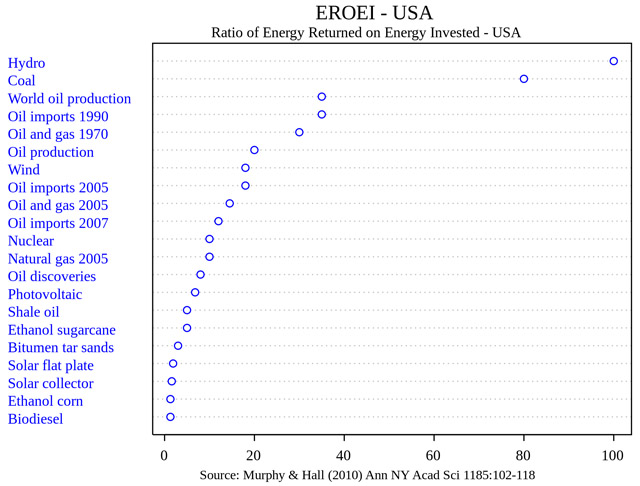Energy return on energy invested (EROEI) is well known, but not widely practiced. Applied to an oil well, EROEI is the ratio of energy represented in crude oil at a wellhead divided by the energy used to drill the well and pump up the oil.
Estimating this ratio for a strictly bounded system is not tough if input and output are measurable. Larger processes that cover steps from discovering fuel to burning it raise definitional issues: 1) collecting data; 2) averaging data; 2) accounting for energy in fuel that is used to refine or transport the same fuel. Thermodynamics also assure that much of the energy captured is lost as waste heat at the point of use.
To keep it simple, suppose EROEI at a wellhead is 40/1. However, if losses + energy to transport and refine fuel are 25%, this ratio drops to 30/1, subtracting the loss only from the numerator. Add the loss to the denominator too, and it’s 30/11. (Is fuel burnt capturing itself a loss in output or an energy input – or both?)
A highly efficient vehicle still loses about 80% of the energy in its fuel tank as heat. If we only count output as energy that does something for us, maybe our EROEI is 6/11. But wait! If we add that heat loss into the denominator also, our EROEI ratio drops to 6/35! To top it off, why did we want to move that vehicle?
Definitional circuses in accounting, economics, and politics distract us from a key insight: Industrial society production and consumption processes waste huge amounts of resources, but one way or another we count the waste as beneficial economic activity. Of all the energy available to us, very little of it adds value.

EROI on this graph and in the article from which it came is the same as EROEI.
If definitions of EROEI were a bit stricter, the ratios would shift to the left (be lower). Regardless of the approximations in measurement, the point of the graph is that returns on energy are dropping.
Since the entire economy runs on energy, of necessity we’re now engaged in races to find alternative sources of energy. However, none have a high return on energy. Neither does high-tech recovery of remote or low-grade conventional fuel. Some readers may be surprised that the EROEI of nuke is so-so; takes a lot of energy to build a nuke plant, plus mine and refine its fuel.
We have to become serious about deriving a lot more benefit from the resources we have available, and soon. That’s the heart of the case for Compression Thinking – before taking up all the other reasons for doing so.
